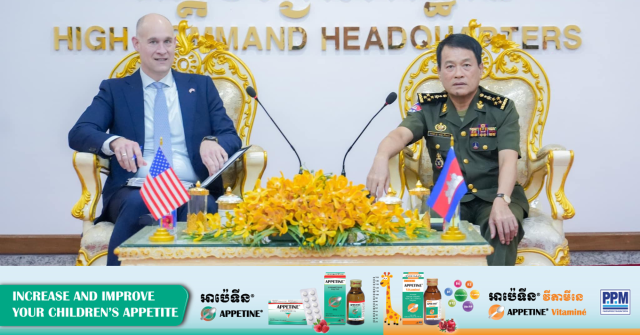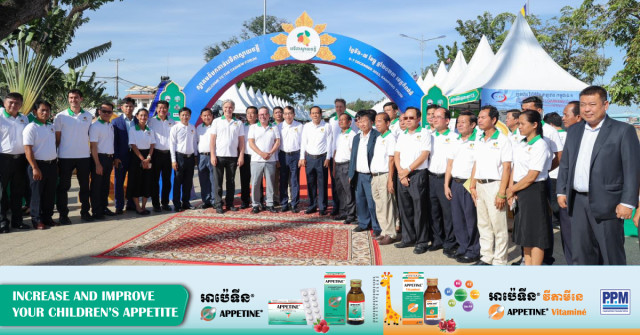Defense Relations with Cambodia “Not Very Good”: US Security Expert

- By Teng Yalirozy
- February 27, 2024 8:00 PM
PHNOM PENH – The United States said its military relations with Cambodia are “not very good,” calling on Cambodia to strengthen coordination with the U.S. on demining and improve the selection of Cambodian soldiers to be sent to the U.S. for training.
Jed Royal, the principal deputy assistant secretary for Indo-Pacific Security Affairs, met with Vong Pisen, the commander-in-chief of the Royal Cambodian Armed Forces (RCAF) on Feb. 26 to discuss how to improve further cooperation between the two countries.
According to Royal, “the relationship between the U.S. and Cambodia military is not very good,” suggesting that the two countries can improve defense cooperation for unexploded ordinance abatement and humanitarian demining and step up the selection of Cambodian recruits to be sent for training at the Daniel K. Inouye Asia-Pacific Center for Security Studies.
He also requested Cambodia to create a working group tasked with seeking the gap between the US and Cambodia and working toward a better future together.
Vong Pisen agreed with Royal about the need to deepen cooperation with the U.S., saying Cambodia always adheres to independent foreign policy and builds friendships with every country to maintain regional and global security.
In 2022, U.S. Defense Secretary Lloyd Austin met former Defense Minister Tea Banh during the ASEAN Defense Ministers’ Meeting (ADMM) in Siem Reap province.
Cambodia said it faced challenges to maintain military ties with the U.S. as America kept concerned over potential threats to regional stability, urging the country to protect its sovereignty.
Tea Banh said military-to-military relations between Cambodia and the United States were at a difficult stage while Lloyd Austin also said the Cambodian-US defense relationship had deteriorated over the years.
However, Vong Pisen said Cambodia was grateful for the U.S. engagement in building peace in the country in the '90s under the United Nations’ framework.
He requested the U.S. to provide more technical, skill and language training to the military, pledging to work with the U.S. to prevent any terrorism and transitional crimes.
Marvin C. Ott, a professorial lecturer and visiting scholar in Southeast Asia Studies at the Johns Hopkins University, said the U.S. “is trying to strengthen its security defense position in the region, against the kind of pressure we feel from China militarily.” “And that involves putting more US military assets, ships and aircraft and things in the region.”
He also emphasized that the U.S. aims to strengthen ties with countries that are willing to work closely with Washington, like Australia, Japan, the Philippines, Singapore, Vietnam, and Indonesia.
“Cambodia is so close to China. I think it is fair to say there is a lot of concern in the Pentagon,” he said, adding that the U.S. relationship with Cambodia's Armed Forces is strained due to cultural shifts in Southeast Asia.
Jed Royal visited Cambodia as part of a trip to Southeast Asia that he’s paying from Feb. 23 to March 4. Traveling with Assistant Secretary for East Asian and Pacific Affairs Daniel J. Kritenbrink, he is set to visit Brunei, Cambodia, Singapore, Thailand and Vietnam.
They also met with Prime Minister Hun Manet to discuss how to deepen the U.S.-Cambodia bilateral relationship and address issues of concern.















